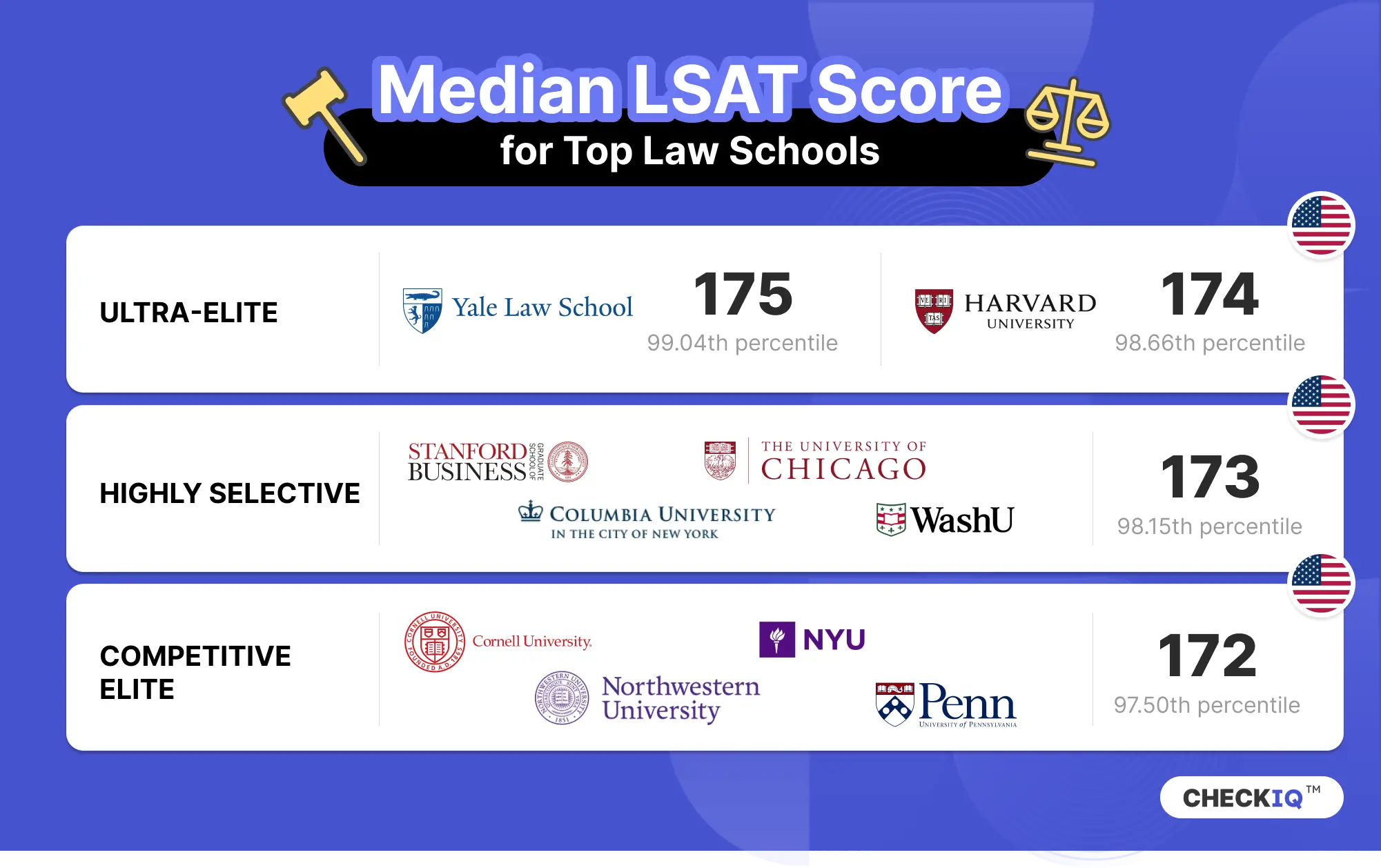
LSAT to IQ Calculator
The Law School Admission Test (LSAT) is an important step for anyone looking to get into law school. It’s mainly meant to predict how well someone might do in law school.
But does your LSAT score say anything about your IQ or intelligence? In this article, we’ll dive into what the LSAT actually measures and explore how it might (or might not) connect to your general intelligence.
What Is the LSAT?
The LSAT is a standardized test required for admission to most law schools in the United States and Canada. It is developed and administered by the Law School Admission Council (LSAC). Since its introduction in 1948, the LSAT has served as a tool to evaluate applicants' potential for success in law school. Over the years, the LSAT has evolved, including its transition to a digital format in 2019 and the introduction of the LSAT-Flex during the pandemic, which allowed students to take the test remotely.
The test is divided into five sections: four multiple-choice sections and one Writing Sample. Each section is 35 minutes long, making the total test time about 3 hours and 30 minutes, including breaks. Your score will fall between 120 and 180, and law schools use it as one of the main factors when deciding on admissions.
What Does the LSAT Measure?
The LSAT focuses on testing the skills you’ll need to succeed in law school, not what you already know. It’s broken into sections that measure specific abilities:
- Logical reasoning: Can you analyze and evaluate arguments?
- Analytical reasoning (logic games): Can you solve puzzles that involve rules and patterns?
- Reading comprehension: Can you understand and analyze complex texts?
- Writing sample: Can you write a clear and persuasive argument? (This part isn’t scored.)
- Experimental section: A surprise, unscored section that tests future questions.
These sections are all about testing how well you think, reason, and solve problems – skills that are super important for law school. The LSAT doesn’t focus on facts or trivia. It’s about how you think and process information.
Understanding the LSAT Bell Curve
LSAT scores range from 120 to 180 and follow a bell curve distribution. This means most LSAT takers score near the middle of the scale, with fewer scoring at the extremes. The average score is around 150, with a standard deviation of about 10 points. Here’s how the distribution breaks down:
- About 68% of test-takers score between 140 and 160.
- About 95% score between 130 and 170.
- Scores of 170 or higher place you in the top 2-3% of test-takers, while scores below 130 are exceptionally rare (more on that topic later in this article)
LSAT scores are accompanied by percentile rankings, which indicate how a test-taker performed relative to others. For example, a score of 160 typically places a candidate in the top 20-25%, making it competitive for many law schools, while a score of 175 or above is often required for admission to top-tier programs.
This distribution helps law schools compare applicants and assess where they stand relative to their peers.
A reliable 100% adaptive online IQ Test. Get your IQ score immediately.
Start My IQ Test
What’s the Difference Between the LSAT and IQ Tests?
While the LSAT and IQ tests measure similar abilities, they focus on different things. The LSAT emphasizes legal reasoning, speed, and understanding its specific test format, while intelligence quotient tests measure a wider range of abilities, like logical thinking, spatial reasoning, and memory. Additionally, the LSAT is designed specifically for predicting success in law school, whereas IQ tests aim to provide a general measure of intellectual potential.
How Well Does the LSAT Correlate with IQ?
While there isn’t a direct study linking LSAT scores to IQ, its strong connection with the GRE offers an indirect link: GRE Verbal and Quantitative scores correlate with the LSAT at r=0.85 according to ETS. And studies show that GRE scores have a strong correlation with IQ, reaching as high as r=0.72.
This suggests that the LSAT likely shares a meaningful, albeit indirect, relationship with IQ by assessing similar cognitive abilities.
However, because the LSAT emphasizes learned reasoning and test-specific preparation, its connection to innate intelligence is less direct than that of an IQ test.
Similarly, research shows that IQ scores can improve with training, such as solving puzzles, practicing IQ tests or reasoning tasks, challenging the idea that IQ is fixed.
Does Preparing for the LSAT Increase IQ?
Studies show that dedicated LSAT study can improve brain activity in areas related to reasoning and problem-solving. Cattell’s theory helps explain this: while "fluid intelligence" (your natural reasoning ability) is harder to change, "crystallized intelligence" (what you learn and practice) can grow significantly with effort. At the same time, research shows that IQ scores can improve with training, such as solving puzzles, practicing IQ tests or reasoning tasks, challenging the idea that IQ is fixed.
While the LSAT is primarily designed to predict law school success, recent research suggests that preparing for the test may also enhance cognitive abilities and increase IQ. A groundbreaking study conducted by researchers at the University of California, Berkeley, revealed that intensive LSAT preparation can lead to measurable changes in brain structure.
The study involved brain scans of 24 college students and recent graduates before and after 100 hours of LSAT study over three months. The results showed increased connectivity between the brain's frontal and parietal lobes, which are the areas associated with reasoning and spatial cognition. Furthermore, this preparation appeared to strengthen circuits that bridge the gap between the brain's left and right hemispheres.
Lead researcher Allyson Mackey noted that the findings demonstrate the malleability of reasoning skills in adults. "We wanted to show that the ability to reason is malleable in adults," Mackey explained, emphasizing that LSAT preparation serves as a form of "reasoning training."
These findings align with the idea that IQ, especially in areas like abstract reasoning and logical analysis, is not fixed but can be improved through targeted cognitive exercises. Thus, studying for the LSAT may function as a form of intellectual enrichment, boosting skills that overlap with those assessed by traditional IQ tests.
How to Convert an LSAT Score to an IQ Score
When attempting to draw comparisons between LSAT scores and IQ, percentile matching is sometimes used as a reference. This method compares the rarity of LSAT scores within the test-taking population to the rarity of IQ scores in the general population. For example, a score in the 99.9th percentile on the LSAT means only 1 in 1,000 test-takers achieves this score, suggesting a high level of cognitive ability. By aligning these percentiles with the IQ scale, we can approximate an LSAT score's corresponding IQ.
Here's a table that shows estimated IQ scores based on LSAT percentiles, along with their rarity among test-takers:
|
LSAT Score |
Percentile |
Estimated IQ |
Rarity (1 in X people) |
|
180 |
99.9th |
145 |
1000 |
|
175 |
99th |
135 |
100 |
|
170 |
97th |
130 |
33 |
|
165 |
93rd |
125 |
14 |
|
160 |
80th |
115 |
5 |
|
155 |
63rd |
105 |
2.5 |
|
150 |
44th |
98 |
1.5 |
|
145 |
26th |
90 |
1.2 |
|
140 |
13th |
85 |
1.1 |
Note: These conversions are approximate and should be interpreted with caution.
The Difference Between LSAT Percentiles and IQ Percentiles
While LSAT percentiles give a sense of how test-takers rank among their peers, they don’t directly translate into IQ percentiles because the groups being measured are different. LSAT scores rank individuals applying to law school, a group that is already academically strong and competitive. In contrast, IQ percentiles measure the general population. This discrepancy means LSAT percentiles might overstate a test-taker's cognitive ranking compared to the broader population.
For example, a 99th percentile LSAT score (achieved by 1 in 100 test-takers) doesn’t necessarily equate to the 99th percentile in IQ, as the pool of law school applicants is not representative of the general population. To draw a meaningful comparison, LSAT percentiles would need to be adjusted to account for the unique characteristics of the test-taking population relative to general IQ norms.
Using High-IQ Society Benchmarks for Normalization
One way to align LSAT percentiles with IQ percentiles is by using benchmarks from high-IQ societies like Mensa. Mensa requires members to score in the top 2% of the population on an IQ test. Interestingly, they accept an LSAT score of 172 or higher as equivalent to this standard. We’ve mentioned some of these high-IQ societies in the FAQ.
By using these benchmarks, we can “normalize” LSAT percentiles, giving a clearer picture of how LSAT scores translate to the general population's IQ scale. This adjustment helps bridge the gap between the LSAT’s narrower test-taking audience and the general population measured by IQ tests. Moreover, it ensures a more accurate interpretation of what LSAT scores mean in terms of intellectual ability.
Does a Low LSAT Score Mean Low Intelligence?
A low LSAT score isn’t a sign of low IQ. While the LSAT measures certain cognitive skills like logical reasoning and reading comprehension, it is significantly influenced by many factors beyond intellectual ability. For example, as you’ll read in the next section, test anxiety, unfamiliarity with the test format, or a lack of preparation can tremendously affect performance. Someone who is highly intelligent may still score poorly due to these external factors.
Similarly, LSAT scores can be affected by small mistakes or time pressure. For example, missing just one or two questions can cause a noticeable drop in score, especially for those performing at very high or low levels.
Finally, while the LSAT does measure some aspects of intelligence, it doesn’t account for other important qualities like creativity, real-world problem-solving, or interpersonal skills. These are the traits that are critical for success as a lawyer. A low LSAT score doesn’t mean someone lacks the potential to succeed in law school or the legal field, especially if they demonstrate strengths in areas like critical thinking, perseverance, or academic achievement.
What Affects LSAT Performance?
The LSAT is a test where preparation can make a substantial difference. Studies show that many people who start with scores in the low 150s can, with practice and effort, improve into the 160s or even 170s. This suggests that a low initial score often reflects a lack of preparation, motivation, or even familiarity with the test rather than a lack of reasoning skills.
The LSAT measures critical reasoning and analytical skills, but many factors beyond intelligence influence your performance. Here's a quick breakdown:
- Study habits: Consistent practice, understanding argument structures, managing time effectively, and reviewing mistakes are crucial for improvement. A solid study plan and good resources can make a big difference.
- Educational background: Exposure to logic-based learning (e.g., philosophy, math), strong reading comprehension skills, and a rigorous academic background can give you an edge. Even without these, focused preparation can close the gap.
- Test-taking skills: Familiarity with the LSAT format, strategic guessing, balancing speed and accuracy, and staying calm under pressure are key to success.
- Personal factors: Physical and mental wellness, test-day conditions, and having a strong support system all play a role in your performance.
- Mindset and confidence: Just like your IQ can be influenced by a growth mindset, a positive mindset and belief in a participant's ability to improve can significantly impact performance. Managing test anxiety, staying focused, and maintaining confidence throughout the test are crucial for optimal results.
Does LSAT Predict Success in Law School?
We all know that the LSAT is a big deal when it comes to getting into law school. It’s the one test everyone seems to stress over. But is it really the best way to predict how well someone will do in law school? A study by researchers Alexia Brunet Marks and Scott A. Moss took a closer look at 1,400 law students to figure out what truly predicts law school success, and the results might surprise you.First, while the LSAT does matter, it’s not the be-all, end-all. Your undergraduate GPA (UGPA) actually has a stronger connection to law school grades. In fact, if you’ve got a high GPA but a lower LSAT score, you’re more likely to perform better in law school than someone with the opposite. Therefore, consistency in your academic record seems to count for more than one test.
Your choice of major can also make a difference! That is because students who majored in STEM fields (science, technology, engineering, or math) or business-related areas like economics or finance tended to do better in law school. These majors seem to teach skills that transfer well to the rigorous reasoning and problem-solving required in legal studies. Basically, it’s almost like adding a bonus of 3 to 4 points to your LSAT score. On the other hand, traditional pre-law majors like political science or history didn’t show the same advantage.
Another surprising factor is work experience. Having several years of experience, especially in teaching, can give you a boost. People with work experience often come into law school with better time management, problem-solving skills, and maturity. However, not all types of work experience are equal. Public-sector or military roles had somehow mixed results, with some individuals excelling and others struggling. The sweet spot for work experience seems to be 4 to 9 years, which shows a balance between real-world knowledge and readiness for academic life.
That said, there are some red flags that could impact your performance in law school. A criminal or disciplinary record was shown to negatively affect grades, almost as if it lowered your LSAT score by seven points. While gender gaps in law school performance appear to have evened out, racial disparities in grades remain an issue, pointing to broader systemic challenges.
Meanwhile, timing and trends in your academic record also play a role. If your college grades improved over time, it’s a good sign, but mostly if you’re going straight to law school after undergrad. If you’re a few years out of school, admissions committees might prioritize other factors, like your work experience, letters of recommendation, or personal statement.
In summary, your LSAT score matters, but it’s not the whole story. A strong GPA, meaningful work experience, and a challenging academic background can all make a huge difference. If you’re worried about your LSAT score, remember that admissions committees are starting to look at the bigger picture, and so should you.
Frequently Asked Questions
What's a good LSAT score?
The average LSAT score is about 153, meaning half of test-takers score above this and half score below. A score of 162 is strong, placing you in the top 20% of test-takers, while a score of 170 or higher is outstanding, putting you in the top 5%.
For most top law schools, competitive scores range from the mid-to-high 160s. Scoring above 170 can dramatically increase your chances of getting into the most prestigious programs.
What LSAT score do I need to get into one of the top law schools?
Here are the top law schools with their median LSAT scores for Fall 2023, according to the U.S. News data:

- Yale University: 175 (99.04th percentile)
- Harvard University: 174 (98.66th percentile)
- Columbia University: 173 (98.15th percentile)
- Stanford University: 173 (98.15th percentile)
- University of Chicago: 173 (98.15th percentile)
- Washington University in St. Louis: 173 (98.15th percentile)
- Cornell University: 172 (97.50th percentile)
- New York University: 172 (97.50th percentile)
- Northwestern University: 172 (97.50th percentile)
- University of Pennsylvania: 172 (97.50th percentile)
The national median LSAT score is 153. Therefore, these top law schools have median scores significantly above the national median. While a high LSAT score is essential, it’s not the only factor to get into these schools. Admissions committees also consider undergraduate GPA, personal statements, letters of recommendation, and extracurricular achievements.
What LSAT score gets you into Mensa and other high-IQ societies?
As mentioned above, high IQ societies, like Mensa International, accept LSAT scores as proof of intellectual ability. Mensa International, but also other organizations bring together people with top scores on IQ and standardized tests, creating a space for those who enjoy intellectual challenges and discussions.
Joining one of these societies can be a great way to connect with like-minded individuals, build meaningful relationships, and engage in thought-provoking conversations. If you love learning, sharing ideas, and exploring new perspectives, being part of a high-IQ society can be both fun and rewarding.
Here's a breakdown of some societies that accept LSAT scores and the qualifying test scores for each of them:
- Mensa: minimum LSAT score 662 if taken prior to 1982, or the 95th percentile if taken after 1982 (currently equivalent to a score of 170). This means you need to score in the top 5% at LSAT if you want to be eligible to Mensa.
- Intertel: minimum LSAT qualifying score of 175 scaled score (or 99th percentile)
- Triple Nine Society: you’ll need to absolutely crush the LSAT to join Triple Nine Society as they accept the top 0.1% of all test-takers (99.9th percentile).
Keep in mind that the requirements for each society may evolve over time, so it's important to regularly check their official websites for the most current and accurate information.







